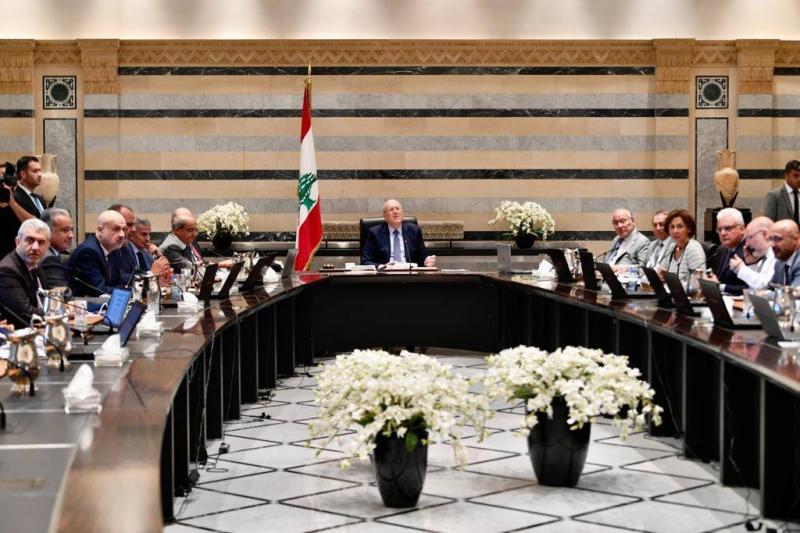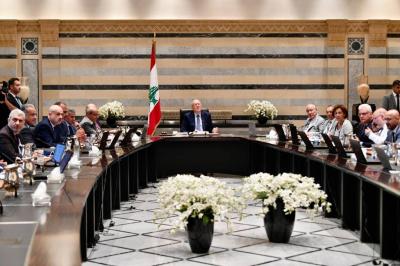Lebanon's caretaker Prime Minister Najib Mikati chaired a Cabinet session today, Tuesday, at the Serail, during which the draft law for the 2024 general budget was approved. At the end of the session, Mikati spoke at a press meeting, stating: "Today, we approved the 2024 budget, and I would like to mention that this is the first budget since 2002 that is approved on time before the start of the second session of the Parliament, which is a significant achievement. If it weren't for the efforts made by the staff at the Ministry of Finance and their team, this would not have been possible. I consider it an achievement and a feat given the current capabilities and resources in public administration, and it was very difficult to finalize this budget at this particular time."
He added, "I can say that the budget is acceptable and has received full consensus from the Cabinet for its adoption, and it will be referred to the Parliament at the end of the week. Simultaneously, committees will be formed led by the Deputy Prime Minister to draft a unified income tax law, amend the public accounting law, restructure the public sector and public institutions, establish a body to coordinate and set standards for information systems in the Lebanese state, reform customs, and control tax evasion regarding value-added tax and luxury goods tax. All of this will be issued as quickly as possible, and the decisions requiring decrees will be issued through decrees, as there are laws that allow us to issue these decisions via the Cabinet, and there are draft laws we will send to the Parliament for approval to complete the necessary reform matters."
He continued, "This is a positive step, but it is not enough. We must continue with the Parliament to approve all reform draft proposals currently in the Parliament, the most important of which is the project for restructuring banks. This is one of the most critical projects in the Parliament's drawers and must be approved to recapitalize banks and restore normal banking operations to avoid ongoing criticisms."
He pointed out that "it is true that the budget has a deficit lower than any previous year, but this deficit is not a budget deficit; today, in 2023, I can say that the cash surplus exceeds the 'cash deficit' regarding revenues and expenses."
He emphasized that "during this tough time, we are keen to scrutinize all spending operations to overcome this challenging phase. We are in a stage that necessitates the cooperation of all; there should not be a team in the Cabinet and another team in Parliament or anywhere else."
He indicated two main issues today: the first is economic, and the second, more importantly, relates to Syrian displaced persons. "Yesterday, I called for a Cabinet meeting to discuss the issue of Syrian displaced persons. Today's newspapers reported on the army commander's statement that this issue is existential and affects the Lebanese entity. This issue is serious enough that it calls for us to be united to confront it. I called everyone to attend the session, and I received confirmations that everyone would be present, but I was surprised by some not attending. I do not want to enter into a dispute with anyone; this issue does not concern me alone or the Cabinet alone, but all of us Lebanese," calling for a joint workshop with the Parliament on economic matters and the displaced persons file.
He said: "We do not claim to be able to do everything, and we hope to work together, for Lebanon cannot be saved in this challenging and sensitive phase without the collaborative efforts of everyone to emerge from this very delicate stage. Therefore, I invite the Parliament to hold continuous meetings, and we are ready to cooperate to take the necessary rescue steps."
He added: "This does not mean we should overlook the issue of electing a new President of the Republic, and the election remains a priority. However, reforms must be accomplished to preserve the minimum state components for the new president to assume their duties with functioning institutions."
He continued: "Yesterday, we made decisions in the Cabinet session regarding the displaced persons issue, and I found today's press comments addressing this matter with sarcasm rather than the seriousness with which the government and the working team handling the displaced persons issue and the army command are dealing with it. We have taken a series of measures to control borders, combat smuggling networks, and regulate non-governmental organizations' work. We requested the Interior Minister to submit reports to the Cabinet immediately, even if we had to withdraw the recognition of these organizations, and to instruct municipalities to control the situation, while forming a delegation chaired by the Foreign Minister to visit Syria. He informed me this morning that he is awaiting an appointment from the Syrian authorities for a visit to Damascus, accompanied by the Director General of General Security, Major General Elias Bechara, and the Secretary-General of the Supreme Defense Council, Major General Mohammad Mustafa, to discuss this issue. In any case, the Foreign Minister will leave this week for New York, where he will meet with the Syrian Foreign Minister to agree on the next steps to be taken."
He emphasized the importance of establishing periodic reports to be submitted to the Cabinet because there is currently nothing more critical than the issue of displaced persons and the threat they pose to Lebanon in this situation. At the beginning of every Cabinet session, there will be a report to follow up on this matter. Additionally, there is a task force at the Serail to monitor these resolutions given their importance on the Lebanese scene.
Regarding public administration employees, he said: "We are all in the same boat, and everyone sacrifices according to their ability. I invite you all to return to the administration to restore revenues, as without them we cannot improve living conditions. We are ready to study this situation with you and fully understand the necessary living needs, so we will be united."
In response to a question about canceling the collection of certain fees in US dollars, he clarified: "We had a meeting yesterday with the International Monetary Fund, which advised that revenues remain in Lebanese pounds, because when the revenues enter the Central Bank, it buys dollars in a more organized manner than the randomness that results from citizens buying dollars to pay their taxes, especially with the presence of the Bloomberg platform, which we approved in the Cabinet as this international platform is transparent."




